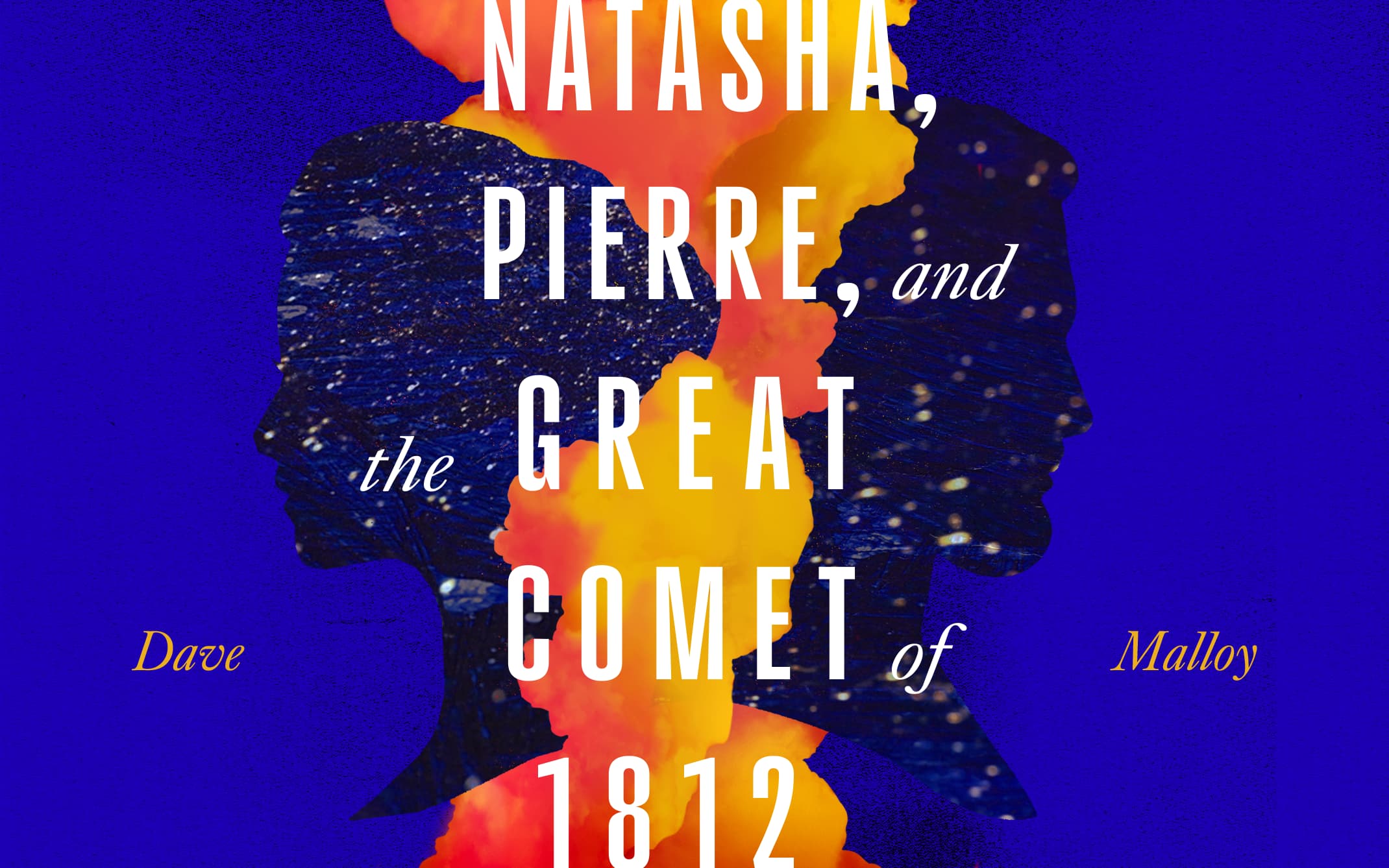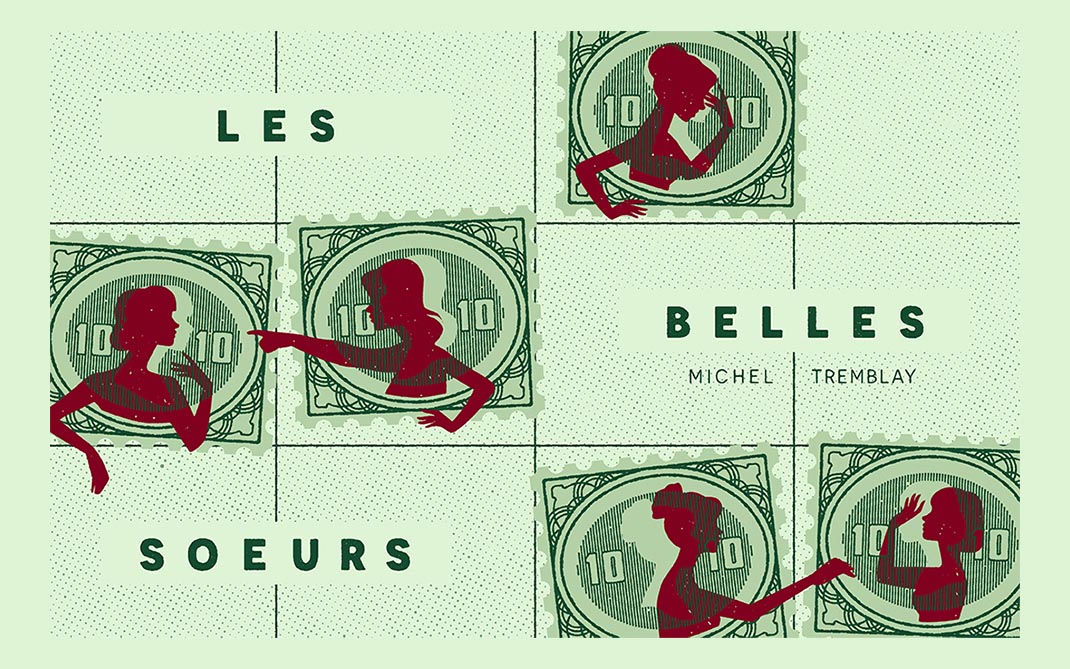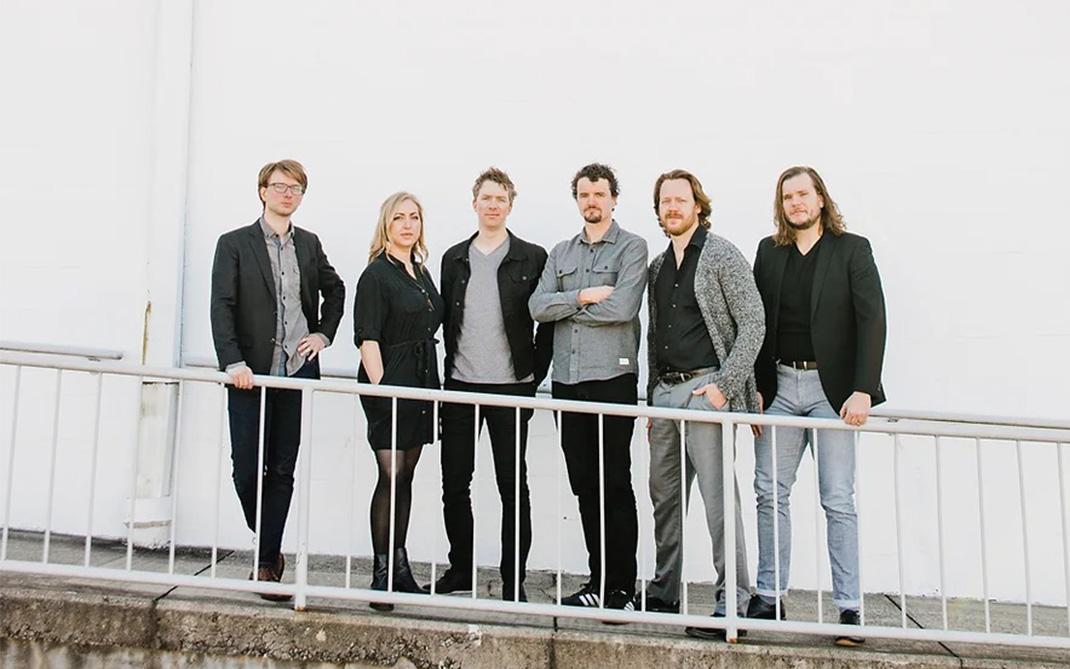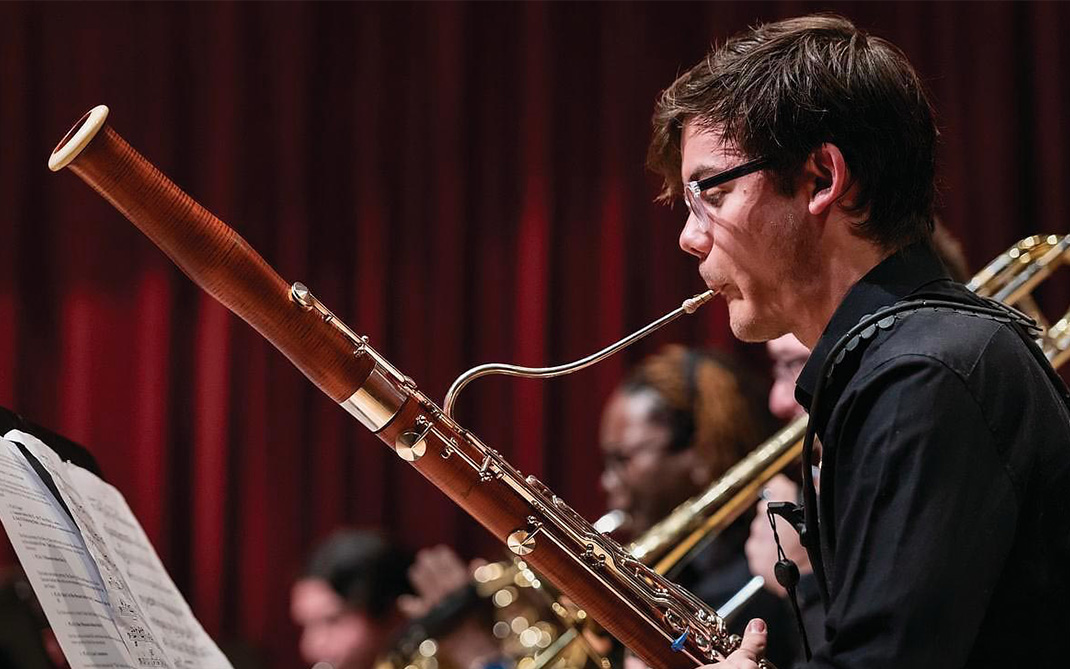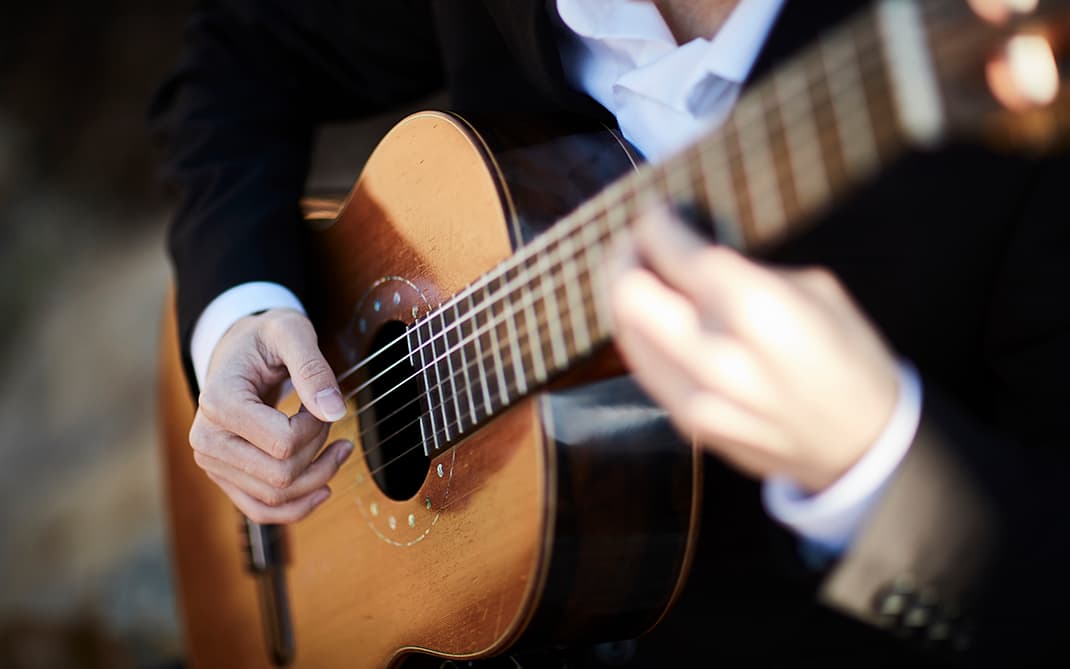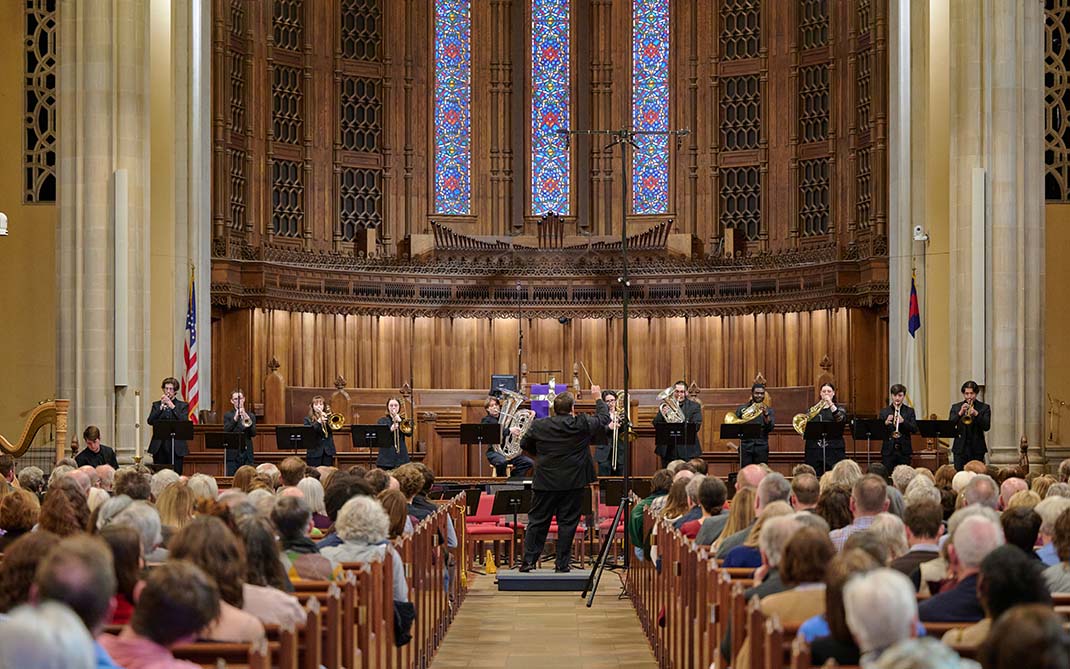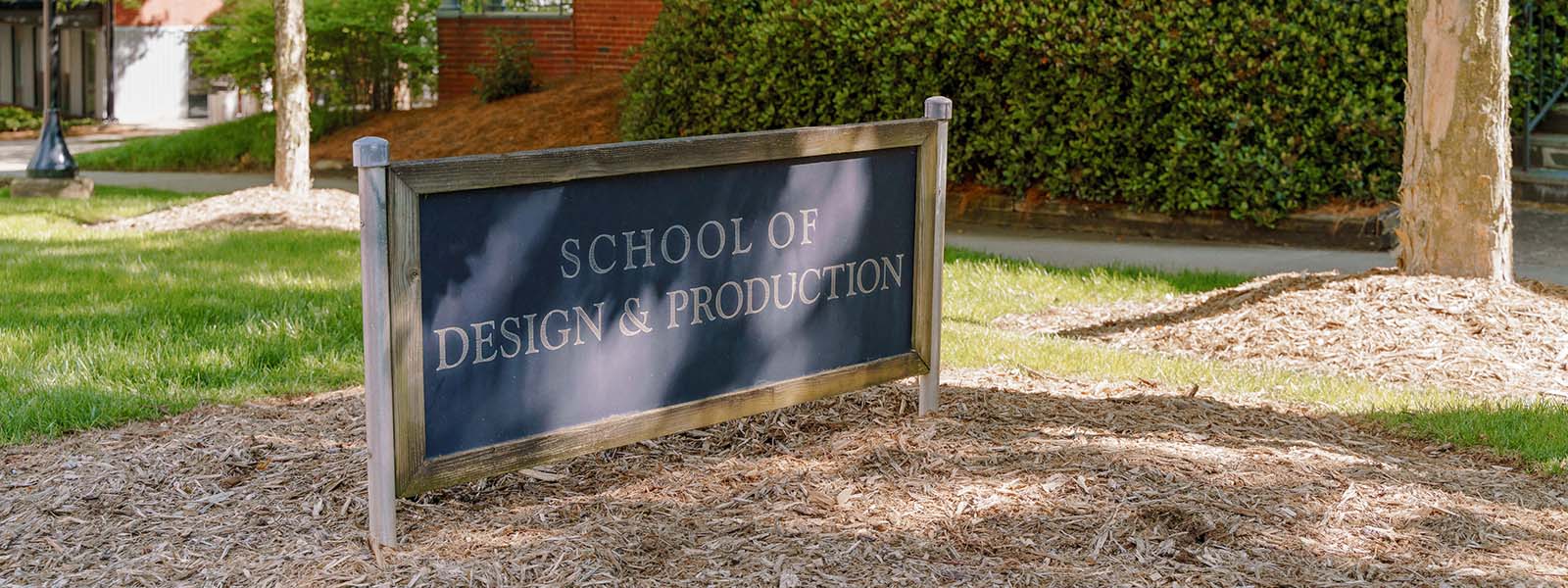UNCSA M.F.A. graduates blend tradition and innovation in Stage Properties
M.F.A. students Henry Beard and Becky Hicks are graduating from the UNCSA Stage Properties concentration with not only a firm understanding of their craft but a blend of research and practical experience linking historical techniques with modern innovation in stagecraft. Beard's path to UNCSA was sparked by a mentor's encouragement and a growing passion for stage props, while Hicks transitioned from stage management to props, driven by real-world experiences and accolades from industry groups.
During their time at the School of Design & Production (D&P), they've explored how traditional methods can meet modern innovation. Beard’s focus on blacksmithing for props artisans and Hicks’ on exploring conservation and restoration techniques are rooted in real-world challenges encountered during productions. Both reflect a deep understanding of the symbiosis between historical craftsmanship and contemporary stagecraft.
All roads lead to UNCSA
Both Beard, from Waco, Texas, and Hicks, from Sioux Falls, South Dakota, studied theater in their undergraduate programs and, feeling the need for further education after graduating, each followed their diverse paths into the world of stage properties.
Beard attended Baylor University and received a B.F.A. in Theatre Design and Technology. At Baylor, he was mentored by a Technical Director who recommended UNCSA because of the school’s reputation and focused Stage Properties concentration. Similar to Beard, Hicks explored many areas of technical theater before landing in props. While at Augustana University as an English and Education double major and Theater minor, Hicks became interested in props while stage managing “Clue: the Musical,” which eventually led her to become the official props manager for the company.

Becky Hicks organizing props for a show.
Hicks won an award at a theater festival from the stage properties professional organization Society of Props Managers (SPM), which encouraged her to pursue the field further. “I wanted to eventually teach at a university but I knew I needed a graduate degree to do that, so I applied to a range of programs and schools and ultimately decided on UNCSA.”
Beard and Hicks had similar experiences when first starting out in the concentration. “When I first got to UNCSA, I had a lot of imposter syndrome,” recalls Beard. “All the focused experience I had in props was one summer program and I felt like everyone around me had much more experience.” It was a feeling Hicks shared. “I had never taken formal props classes before and there were so many technical theater things I didn’t know,” she explains. “It was all very intimidating.”
But today, both Beard and Hicks feel confident and capable as they have been able to be part of numerous productions, had opportunities for leadership and the benefit of faculty mentorship. “I’ve had the opportunity to do so much more than what was available to me at my undergraduate theater department because of the huge amount of resources available here,” says Hicks. Beard adds that he has loved how focused the concentration is. “I’ve been involved in many major productions and been the shop foreperson in the prop shop,” he says.
Advancing the field
As part of the graduate degree program in D&P, students are required to write and create a thesis based on research within their field or a production that they worked on. Both Beard and Hicks chose written theses on topics of particular interest to them.
My thesis focuses on learning a historic skill and transferring it into what we do in props, which could potentially help a lot of artisans.
Henry Beard
Beard chose to focus his thesis on blacksmithing for props artisans and his source of inspiration was a UNCSA production. “We needed a part for a show and it was going to cost over $100 and would have taken a while to arrive,” he recalls. “I offered to blacksmith it because it only took $5 and two hours.” This made Beard to realize that if more props artisans learned about blacksmithing it could save time and money when working on productions that required speciality items. “Unlike the past, which focused on function, most blacksmithing is artistic,” Beard explains. “My thesis focuses on learning a historic skill and transferring it into what we do in props, which could potentially help a lot of artisans.”
Hicks also focused on history in her thesis as she researched the conservation and restoration of household items for museum presentation. Putting it together into a deliverable, she had fun and got creative with the theme. “I picked different furniture and household items and presented them in a final thesis exhibition that was curated around different dad archetypes.” Her research spanned thousands of years and was distilled down into the history and science of, as well as restoration techniques for, ceramics, plastics, furniture, paper, books, and oil paintings.
Connecting the past with the present
While studying as full-time graduate students, being involved in many productions and having leadership roles in the prop shop, both Beard and Hicks overlapped in another aspect of their lives: being historic interpreters at Old Salem Museums and Gardens (opens in new tab).
Located less than a mile from the UNCSA campus, Old Salem is a historic district with a living history museum and is one of the country’s most comprehensive history attractions. Old Salem visitors can move through different museum buildings in the district and learn from interpreters about the Moravian people who settled in the area in the mid-18th century, as well as the Black and Indigenous populations that lived in the area.
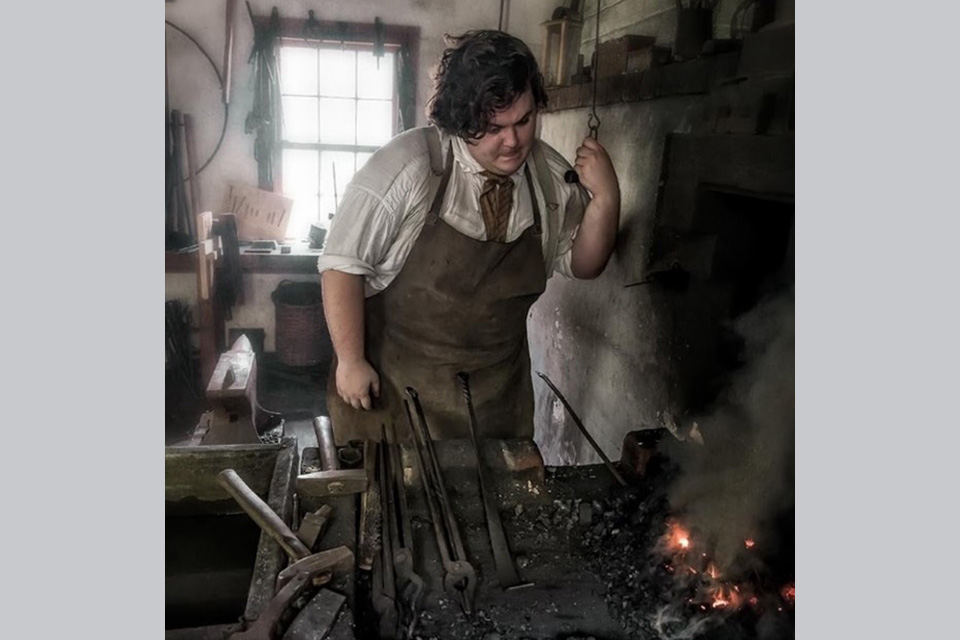
Beard working as a blacksmith in Old Salem Museums and Gardens.
Every week, Beard and Hicks would don their 18th-century garb and explain different artisan techniques to museum visitors. Hicks focused mainly on ceramics and got to show visitors how pottery used to be made with a manual wheel. Beard also started in ceramics but moved to gunsmithing and joinery, utilizing skills learned in the prop shop. Learning new skills was second nature to Beard and Hicks as it’s what they do every day. “Props people are Swiss army knives,” explains Beard.
Hicks adds that she was able to connect work in Old Salem with her thesis since it was a different version of object storytelling. “One of my topics in my thesis research was technique preservation and was inspired by more work in Old Salem. In my work as a potter, I made a new mold for a flower pot which is a great example of not just preserving items but also preserving techniques,” Hicks explains.
Journey to the past
As part of their respective interests and thesis research, during the summer of 2023, Beard and Hicks decided to team up and embark on a two-and-a-half-week road trip up and down the east coast visiting a total of 37 different museums to gather research, including some of the most well-known museums in the country.
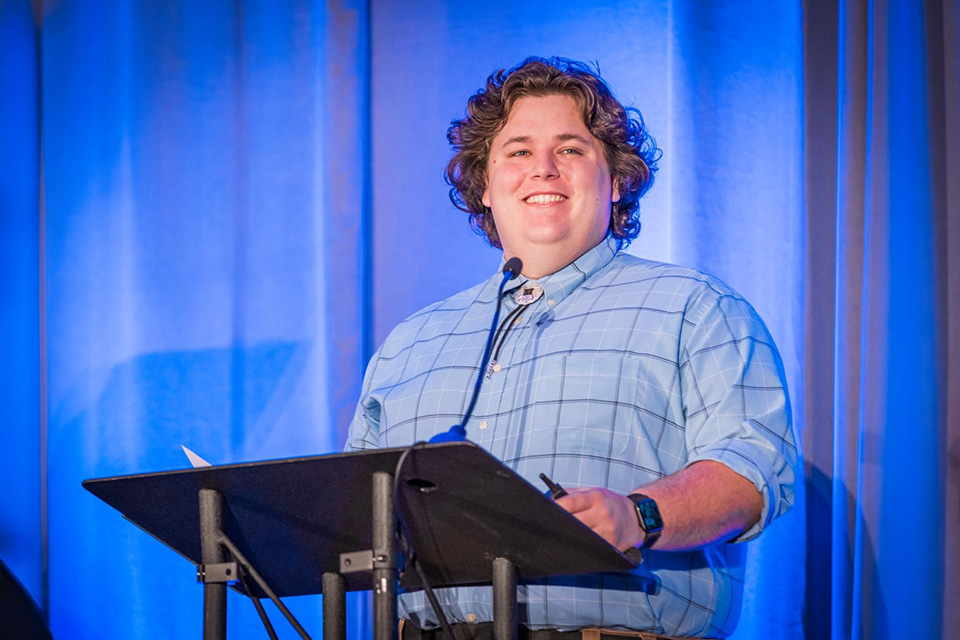
Beard presenting about his and Hicks' road trip at the 2024 annual Scholarship Luncheon.
Equipped with a $3,000 grant from the Semans Art Fund (opens in new tab) that covered travel expenses, they spent months researching what museums they would visit, where they would stay and who they would be able to connect with in each location. “We knew we had to get our planning and timing down perfectly so we could make the most of the time and budget we had available,” explains Hicks.
Since their theses each had a different focus, they found towns that had museums that covered each of their interests. For blacksmithing, Beard focused mainly on living history sites with active forges. “We were able to use our Old Salem credentials to make connections with the staff at the different living history museums, which was extremely helpful,” says Beard.
Hicks, on the other hand, searched for museums that would help her learn more about conservation and searched for exhibits that could relate to her thesis. “It was amazing to see how museums can be so different, from interactive displays to teaching visitors how to look at art,” recalls Hicks.
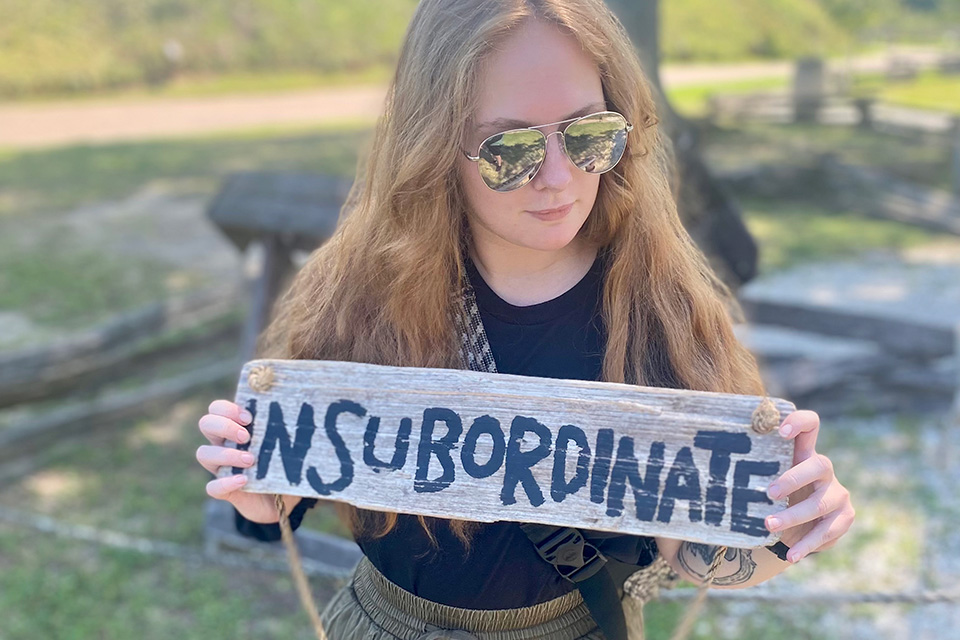
Hicks at a living history museum during their two and a half week road trip along the east coast.
Overall, Beard and Hicks say that their trip was a profoundly impactful experience. “The locations were gorgeous,” says Beard, “it’s very different from what I knew growing up.”
The road ahead
Though post-graduation plans are still up in the air for Beard and Hicks, they both have a general idea of what they want to do. Beard plans on moving to the United Kingdom to join his spouse who works in Stratford-upon-Avon with the Royal Shakespeare Company. “I would like to work in either entertainment or museums,” he says. “Though they are different, I feel like I have a lot of skills that translate well to both industries.”
The more you put into your education, the more you can grow.
Becky Hicks
Hicks is casting a wider geographic net and looking across the country for opportunities to apply her vast skill set. Directly applying what she has learned through her degree, thesis work and time at Old Salem, she says she would like to work with art installation or museum installation work. “I eventually want to teach, but right now, I’m looking for something that is educationally based.”
When looking back at their three years at UNCSA, Beard and Hicks have several nuggets of advice for prospective graduate students. “The more you put into your education, the more you can grow,” shares Hicks. “Leave yourself open to working in different realms and never stop learning and reading.” Beard shares a similar sentiment, adding, “Live curiously and look around.” And for those who are worried about imposter syndrome, Beard shares, “You don’t have to be more than you already are to be enough.”
Get the best news, performance and alumni stories from UNCSA.
SUBSCRIBE TO OUR NEWSLETTERS(OPENS IN NEW TAB)(OPENS IN NEW TAB)(OPENS IN NEW TAB)(OPENS IN NEW TAB)(OPENS IN NEW TAB)(OPENS IN NEW TAB)(OPENS IN NEW TAB)(OPENS IN NEW TAB)(OPENS IN NEW TAB)(OPENS IN NEW TAB)(OPENS IN NEW TAB)(OPENS IN NEW TAB)(OPENS IN NEW TAB)(OPENS IN NEW TAB)(OPENS IN NEW TAB)(OPENS IN NEW TAB)(OPENS IN NEW TAB)(OPENS IN NEW TAB)(OPENS IN NEW TAB)(OPENS IN NEW TAB)(OPENS IN NEW TAB)(OPENS IN NEW TAB)(OPENS IN NEW TAB)(OPENS IN NEW TAB) (opens in new tab)
May 10, 2024
